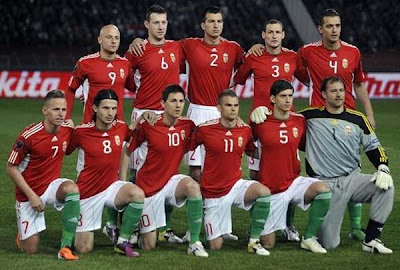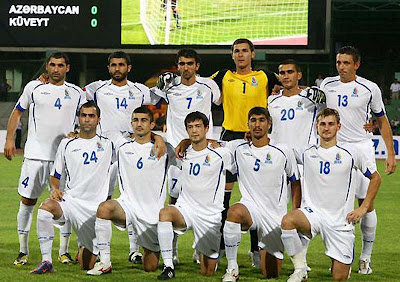San Marino national football team
Senin, 31 Oktober 2011
Minggu, 09 Oktober 2011
Hungary national football team

Hungary national football team
The Hungary national football team represents Hungary in international football and is controlled by the Hungarian Football Federation.
It has remarkable football history, having won three Olympic titles, finishing runners-up in the 1938 and 1954 FIFA World Cups, and third in the 1964 UEFA European Football Championship. Hungary revolutionized the sport in the 1950s, laying the tactical fundamentals of Total Football and dominating international football with the remarkable Golden Team which included legends like Ferenc Puskás, top goalscorer of the 20th century, whom FIFA dedicated its newest award, the Puskás Award. The side of that era has the all-time highest Football Elo Ranking in the world, with 2166 in 1954, also they have the second highest all-time Elo ranking of 2156, set in 1956, and one of the longest undefeated runs in football history, remaining unbeaten in 31 games, spanning over more than 4 years and including matches such as the Match of the Century.
The post-golden age decades saw a gradually weakening Hungary, though recently there is renewal in all aspects. The Hungarian Children's Football Federation was founded in 2008, as youth development thrives. For the first time in Hungarian football's history, they hosted the 2010 UEFA Futsal Championship in Budapest and Debrecen, the first time the MLSZ staged a UEFA finals tournament. Also, the national teams have produced some surprise successes such as beating Euro 2004 winner Greece 3–2 and 2006 FIFA World Cup winner Italy 3–1. Although they haven't qualified for a major tournament's finals since 1986, they came semi-finalists at the 2008 European Under-19 Championship and qualified for the 2009 FIFA U-20 World Cup which saw their U-20 national team gaining third place to bring home Hungary's first major tournament medal in nearly half a century, feeding their hopes of a future revival. Young Talents such as Balázs Dzsudzsák, Vladimir Koman and Ádám Szalai give more hope to the Hungarian team.
Source : Wikipedia.com
Azerbaijan national football team


Azerbaijan national football team
The Azerbaijan national football team (Azerbaijani: Azərbaycan milli futbol komandası) is the national football team of Azerbaijan and is controlled by Association of Football Federations of Azerbaijan. It represents Azerbaijan in international football competitions.
The Azerbaijan national football team has taken part in qualification for each major tournament since Euro 96, but has never qualified for the finals tournament of any World Cup or European Championships.
Source : Wikipedia.com
Austria national football team


Austria national football team
The Austrian Football Association was founded on 18 March 1904 in the Empire of Austria-Hungary. The team enjoyed success in the 1930s under coach Hugo Meisl becoming a dominant side in Europe and earning the nickname "Wunderteam". On 16 May 1931, they were the first European side to defeat Scotland. In the 1934 FIFA World Cup, they finished 4th after losing 1–0 to Italy in the semifinals, and 3–2 to Germany for Third place. They were runners-up in the Football at the Summer Olympics 1936, again losing to Italy, 2–1. (They had actually lost in the quarterfinals to Peru, but were re-instated after Peru withdrew after a re-match was ordered.)Austria had qualified for the 1938 finals, but due to the Anschluss on 12 March of that year, Austria was annexed to Germany. Already on 28 March,[1] FIFA was notified that the Austrian FA had been abolished, meaning also withdrawal from the World Cup, with the German team representing also Austria. Theoretically, a united team could have been an even stronger force than each of the separate ones, but German coach Sepp Herberger had little time and very few games to prepare and merge the very different styles of play and attitude. The former Austrian professionals outplayed the rather athletic yet amateur player of the "Old Empire" in a "reunification" derby that was supposed to finish as a draw, yet in the waning minutes, the Austrians scored twice, with Matthias Sindelar also demonstratively missing the German goal, and subsequently declining to be capped for Germany. In a later rematch, the Germans took revenge, winning 9–1. In early April, Herberger inquired whether two separate teams could enter anyway, but "Reichssportführer" Hans von Tschammer und Osten made clear that he expected to see a 5:6 or 6:5 mixture of players from the two hitherto teams. As a result, five players from Austria Wien, Rapid Wien and Vienna Wien were part of the team that only managed a 1–1 draw in Round 1 against Switzerland, which required a rematch. With Rapid Wien's forward Pesser having been sent off, and not satisfied with two others, Herberger had to alter the line-up on six positions to fulfill the 6:5 quota again. The all-German team led the Swiss 2–0 after 15 minutes, but eventually lost 4–2 in Paris, in front of a rather anti-German French and Swiss crowd, as few German supporters were able to travel to France due to German restrictions on foreign currency exchange. After World War II, Austria was again separated from Germany. Austria's best result came in 1954, when they lost the semifinal 6–1 to eventual champion Germany, but finished third after beating defending champion Uruguay 3–1. This remains their best result ever, and unfortunately the last time for decades that Austria reached the end round of a major tournament. Over the years, a strong yet mainly lopsided rivalry with Germany developed.
Source : Wikipedia.com
Langganan:
Postingan (Atom)










